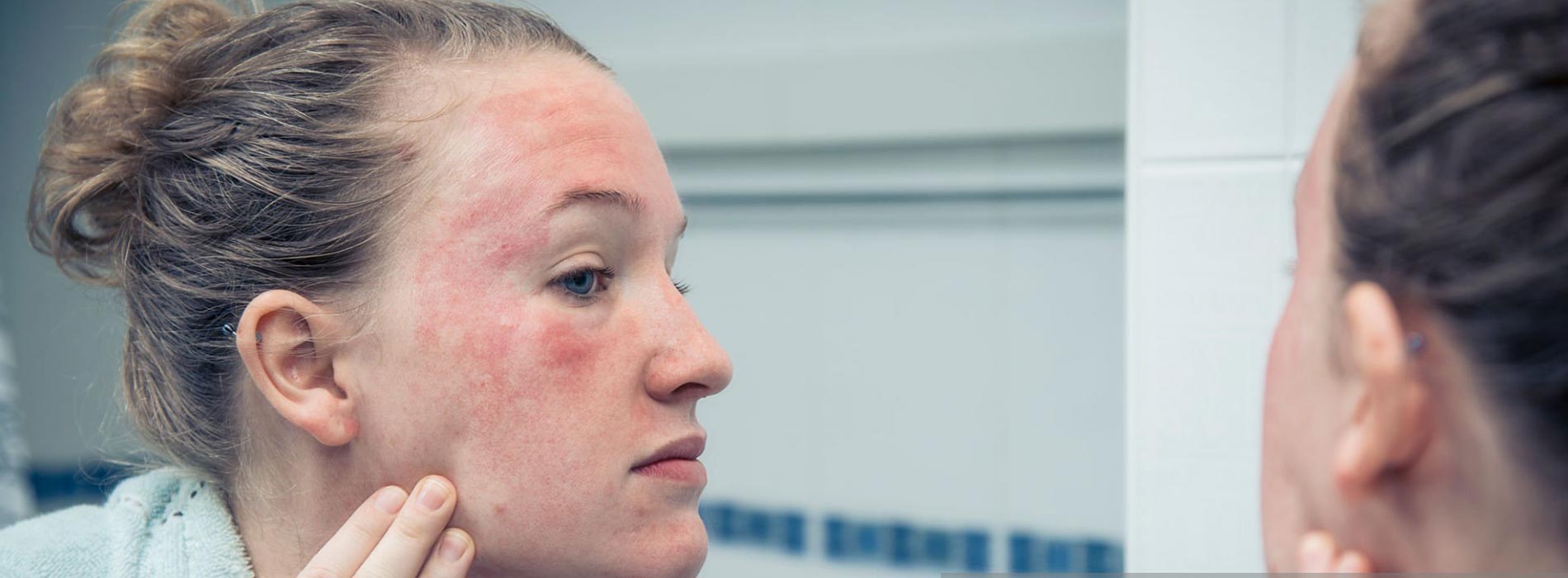Eczema (atopic dermatitis) is a medical condition characterised by having patches of inflamed skin that are often dry and itchy. It’s a condition that affects people of all ages, but infants are commonly diagnosed with this disease. In Australia, eczema affects around 10-15% of the general population and 38.5% of those are infants. Most children with eczema recover from the disease once their skin starts to mature, but some kids continue to have eczema well beyond adulthood.
Eczema can be debilitating and reduce one’s quality of life if left untreated. The skin acts as a protective outer layer, but this barrier function is compromised in skin that is very dry or eczema-prone. It becomes more susceptible to damage from allergens, bacteria, environmental factors, and other irritants, which can lead to red, dry, tight and itchy skin. If the skin is scratched and broken, it may result in a secondary bacterial infection.
The key to managing eczema is reducing exposure to triggers and keeping symptoms under control. There are different ways of treating eczema depending on the type and severity. Over-the-counter (OTC) treatments, prescription medication such as corticosteroid creams, and lifestyle changes can help to a certain extent in minimising eczema symptoms.
One safe and natural alternative many people are considering is Traditional Chinese Medicine (TCM), using acupuncture and Chinese herbal medicine to help with managing their eczema symptoms. Some patients may also supplement their existing eczema treatment with acupuncture to better manage their symptoms. Today we will be discussing how acupuncture can help with eczema and what are the advantages of using TCM.
Identifying symptoms of eczema
People with eczema have areas of dry, itchy skin which can progress to a red or pink scaly rash with or without crusting or oozing. Over time, thickening and cracks in the skin can occur because of repeated itching and scratching.
Symptoms of eczema may include:
- Skin dryness
- Severe itching
- Rough and scaly skin
- Redness, rash
- Increased sensitivity in skin – very reactive to allergens and irritants
Eczema can appear anywhere on the body and the location may vary depending on your age.
- Eczema in babies usually manifest on the cheeks, chin, trunk and scalp.
- Adults and older children often have eczema inside their elbows, behind the knees, and on the wrists, ankles, neck and ears.
- Some adults are more prone to getting eczema on their hands, especially if their work involve handling of harsh chemicals or repetitive hand washing.
Eczema symptoms may vary for each individual and not everyone responds the same way to treatment. The best way to manage eczema is to talk to your medical practitioner and find out which treatment would be most suitable for your skin.
Causes of eczema
The exact cause of eczema is still unknown, but genetic and environmental factors play a huge role. Often people with eczema have family members also suffering from this condition and/or other allergic conditions such as hay fever and asthma. This suggests that those with family history of eczema have a higher risk of developing the disease.
The skin of people with eczema has impaired ability to retain moisture, therefore it dries out more readily and can crack. This means that the skin is more open to attack of allergens and other irritants, which triggers the body’s immune system to release chemicals that cause the itching. Here are the common triggers of eczema:
- Allergens (mould spores, dust, animal dander, etc.)
- Contact with irritants in the environment
- Excessive heat
- Allergic reaction to certain foods
- Stress
How acupuncture and Chinese medicine can help
Traditional Chinese medicine (TCM) such as acupuncture and herbal medicine can be used as a safe and natural alternative for managing eczema symptoms or as supplement therapy to conventional treatments. TCM has been used in China for over 2500 years, and is now a popular treatment used around the world. It focuses on the balance of the body’s internal systems to achieve optimal health. Imbalance of the body’s energy (Qi), blood, yin and yang can result in the development of diseases. TCM has a holistic approach, treating the human body as a whole rather than looking at a particular symptom only, aiming to bring the whole body back into balance.
According to TCM, eczema is a skin condition that results from an internal imbalance in the body. Treatment with acupuncture and herbal medicine can help with symptoms of itchiness, scaling, redness, raised patches and reduce the number of flare-ups. The end goal is to overtime restore the balance within the body.
Acupuncture works on the basis that the body’s internal organs have interconnecting channels where Qi (energy) flows. If there is blockage in these channels, the flow of Qi is disrupted and the body becomes susceptible to illness. Acupuncture removes these blockages and promotes a healthy flow of Qi inside the body. In treatment of skin disorders such as eczema, thin, sterile needles are inserted in different acupuncture points located in the torso, legs, and arms, to stimulate them and remove any blockages. It also works on the nervous system and the pathway of itching. Reduced itching means less scratching that may lead to redness and inflammation, further exacerbating the eczema. Herbal medicines are often used in combination to reduce inflammation and itchiness, and if needed to help with stress and improve quality of sleep which may contribute to improved eczema.
Currently, there are no long-term studies that have comprehensively investigated the effects of acupuncture in managing eczema, but patients who have undergone the treatment have reported positive results. Further research is needed in evaluating the efficacy of acupuncture for eczema. There is a considerable amount of anecdotal evidence within the profession about good responses to treatment, especially a reduction in itching and discomfort.
Aside from acupuncture and herbal medicine, TCM also focus on healthy lifestyle habits and eating choices. In general, some patients may find it beneficial for their eczema to limit intake of alcohol, shrimp, and crab; while incorporating plenty of leafy green vegetables and fruits is highly recommended.
Lifestyle tips for eczema:
- Use soap-free or ph-balanced product instead of ordinary soap which can irritate or dry out the skin.
- Avoid extremes in temperatures such as over heating or over cooling the house, prolonged exposure to hot or cold air-conditioning can dry out and irritate the skin, take lukewarm not hot bath or showers.
- Gently pat skin dry with towel after showering instead of rubbing.
- Wear clothing with non-irritating materials such as cotton, avoid wool, polyester or acrylic. Remove scratchy labels from clothing
- Wear cotton-lined gloves when washing dishes or working with irritants.
- Swim in the sea and avoid chlorinated pools where possible. Seawater may help with eczema symptoms.
Find Out More
At Baolin Acupuncture and Chinese Medicine Centre, we use a combination of acupuncture, herbal medicine and dietary advice to help with relief of eczema symptoms. The frequency and duration of your treatment will vary depending on severity and length of the condition, and how your body responds to acupuncture. Most patients see results within the first 3 to 5 weeks of treatment, depending on the severity of the eczema.
For more information regarding acupuncture for managing your eczema symptoms please contact us at our Perth or Subiaco clinic (Perth: 9228 8828; Subiaco: 9380 4171). Alternatively, you can send us your queries through our online contact page.


